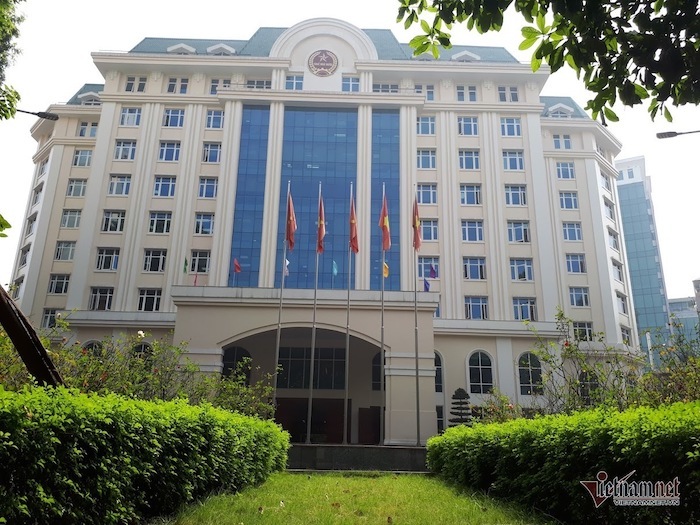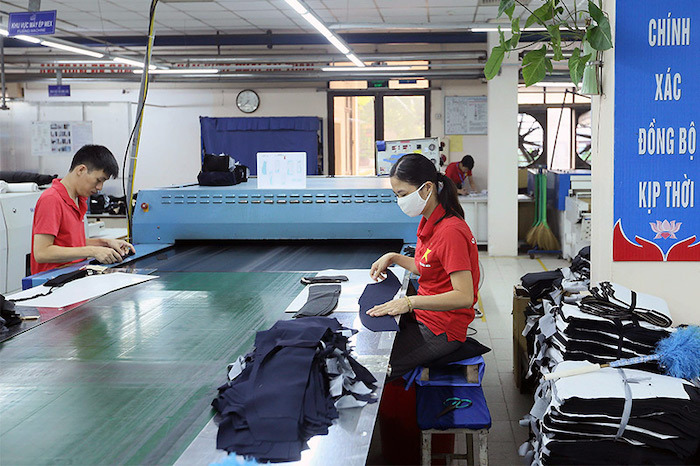On April 13, 2018, the General Department of Taxation received a document that was a turning point in the history of the taxation sector. That was Decision No. 520/QD-BTC of the Ministry of Finance, about the roadmap for the arrangement and merger of the system of provincial and municipal tax departments.
Accordingly, at least 50% of the total number of tax departments had to be dissolved and merged by the end of 2020.
Turning point
 |
|
The number of department-level officials of tax agencies has been reduced by thousands. Photo: Luong Bang
|
By that time, the taxation sector had implemented many reforms in accordance with the Government’s Resolution 19 on administrative procedure reform and improving the business environment. Nearly 100% of enterprises in Vietnam had made electronic tax declarations, minimizing direct contact with tax officials. However, the number of tax officers was still more than 80,000 people.
In many places, the taxation sector was still sending staff to businesses to collect taxes, although the tax revenue collected in a month was less than half of the pay for these staff. A survey by the Vietnam Chamber of Commerce and Industry (VCCI) showed that the "service by tax officials" index was only 5.36 points in 2014, and 6.36 points in 2016, at an average level.
The bulkier the apparatus, the more difficult for the tax sector to conduct reform and modernization. For many years, Vietnam was always ranked very low in the World Bank’s business climate reports for the time businesses spent on tax declaration.
In 2013, for example, the average tax payment time of ASEAN-6 countries was 171 hours per year; in particular, 259 hours for Indonesia, 264 hours for Thailand, 193 hours for the Philippines, 133 hours for Malaysia, 96 hours for Brunei, 82 hours for Singapore. For Vietnam, it was 876 hours, five times higher than the average of ASEAN-6.
Reforms must come from institution
In the Government’s Resolution 19 on improving the business environment in 2014, the Prime Minister assigned the tax sector to: reform the process, application and procedures for tax payments, and shorten the time that enterprises have to spend on completing tax payment procedures to the average of the ASEAN-6.
Finance Minister Dinh Tien Dung said: “The first thing I am interested in when I manage the ministry is institutional reform. The budget is always a concern, but to solve the major problem, it must come from the institution. The important thing is how to remove difficulties for production development because revenue must be from production to be stable."
Dung said: “I strongly support the Government's Resolution 19 to improve the business environment. There are long-existing problems that must be changed over the years. I told tax officials that we have to overcome ourselves because we are the one who make circulars, decrees, and even laws that get in the way of businesses. It is partly due to the problem of thinking, partly because of the issue of interest, which we can break it out."
Resolution 19 and Resolution 02 have set very specific targets to the tax sector, which are very close to criteria of the region and the world. The recent administrative procedure reform in the tax sector has made great progress.
In 2017, Vietnam's general tax payment index in the World Bank's Business Environment Report increased by 81 spots, ranking 86/190 countries and territories. In ASEAN, Vietnam was behind three countries: Singapore, Thailand and Malaysia. This shows that the space for reform is still immense, as long as there is determination.
 |
|
The taxation industry will implement even more reforms and innovations.
|
During a meeting between Prime Minister Nguyen Xuan Phuc and the Ministry of Finance at the end of 2017, General Director of the General Department of Taxation Bui Van Nam pledged: "The taxation industry will surpass itself to implement reforms."
The efforts of many leaders of the Government, the Ministry of Finance and the General Department of Taxation, and especially the Resolution 18-NQ/TW dated October 25, 2017 of the 12th Central Committee on renovation, streamlining organizational structure of the political system, led to the issuance of Decision No. 520 with the goal of cutting half of the total number of tax offices in the country.
By early 2020, the tax system completed the consolidation of tax bureaus. The number of local tax agencies after merging was 415 (the plan was 420) from a total of 711 tax bureaus.
Thousands of employees have been cut but the system still operates smoothly, without any disturbance while ensuring budget revenue and state management.
World recognition
The number of employees fell, while technology was modernized. As a result, huge changes in the reform of administrative procedures have been recorded, making positive impact on improving the business environment and national competitiveness.
According to the Steering Committee on Administrative Reform, the Public Administration Reform index of the Ministry of Finance ranked 2 out of 18 ministries and ministerial-level agencies. Regarding the readiness index for information technology development and application, evaluated by the Ministry of Information and Communications in coordination with the Vietnam Information Technology Association, the Ministry of Finance ranked first among ministries and sectors for seven consecutive years.
The World Bank's annual report on business environment in 2020 announced drastic reforms in Vietnam’s tax sector, and this index increased by 22 spots from 131st to 109th out of 190 countries.
Most of the indicators for this index saw an improvement. Particularly, the tax payment time reduced from 498 hours to 384 hours, with 94 hours reduced due to reform, simplification of the value added tax declaration procedures and 20 hours reduced due to reforms, and simplification of corporate income tax declaration procedures. The tax payment time also reduced from 10 times in 2019 to 6 in 2020.
With Vietnam's tax payment index increasing by 22 steps, the taxation sector exceeded the target set by the Government in Resolution No.02/NQ-CP, approaching the target by 2021.
Space for reform is immense
Enterprise satisfaction about tax administrative procedures in 2019 reached nearly 78%.
President of the Vietnam Chamber of Commerce and Industry (VCC) Vu Tien Loc said that the tax industry has taken the world's criteria as standards for reform and the satisfaction of people and businesses as a goal towards reforming administrative procedures.
“The Ministry of Finance has accompanied VCCI to organize many conferences to listen to the opinions of the business community, thereby amending and supplementing tax policies to suit the practical situation, meeting the requirements of reform," he said.
Tu Giang - Lan Anh

Unclear provisions in new tax-related Decree
Vietnamese citizens and commercial banks alike have expressed uncertainty over the new Decree 126 on Tax Administration that requires banks to provide customers’ information as well as deduct tax payables on behalf of the tax department.

Tax collections from cross-border platforms too low
The amount of tax collected from cross-border platforms in the first 11 months of 2020 was about VND1 trillion. But the figure doesn’t truly reflect the real activities of the platforms in Vietnam.